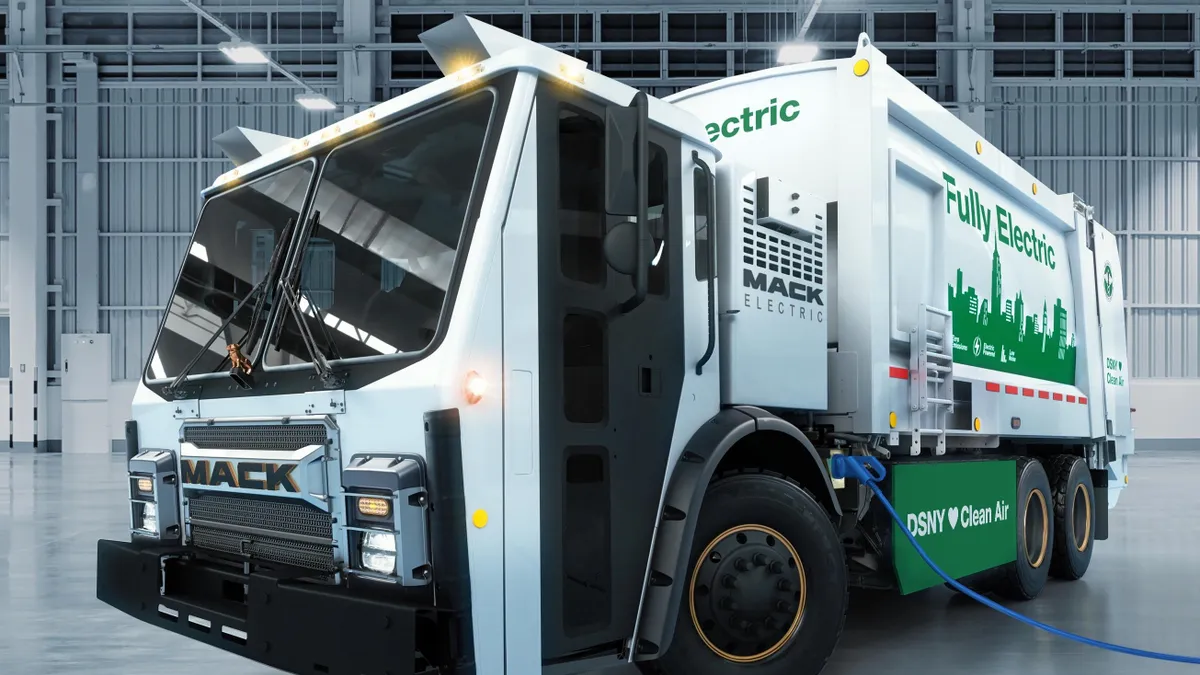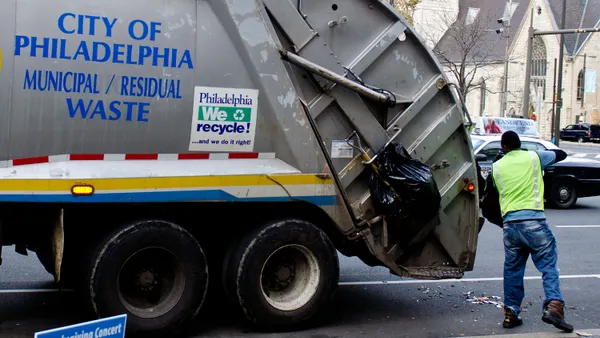Dive Brief:
- United Auto Workers members are now striking five plants after rejecting a tentative agreement with Mack Trucks, the union announced Sunday. One of the plants, in Lower Macungie Township, Pennsylvania, assembles all of Mack’s Class 8 heavy-duty trucks, including the Mack LR Electric.
- Mack Trucks, a division of Volvo Group, offered a 19% wage increase and some healthcare, pension and time off concessions in an agreement rejected by 73% of union members on Sunday. Key ongoing demands for the workers include cost of living adjustments, the abolition of a tiered retirement system and progression to the top union wage.
- About 3,900 Mack Trucks members began picketing this week, bringing the total number of struck workers to more than 30,000. The UAW has seen the number of its members on strike swell since contracts expired with Ford, General Motors and Stellantis at the end of the day on Sept. 14.
Dive Insight:
The strike affects production of refuse vehicles just as truck deliveries get back on track from pandemic-induced supply chain delays. Mack’s waste industry offerings include front- and rear-loading vehicles and diesel, compressed natural gas and battery-electric fuel types.
North Carolina-based Mack produces all its North American trucks within the continent. Its parent company has seen orders and deliveries remain strong through the second quarter of this year, according to Volvo’s most recent earnings call. Orders were reportedly up 25% year-over-year in the second quarter across Macks’ business, and the union cited Mack’s operating profit margin of more than 10% last year as a sign of strong business.
In a statement following the vote on Sunday, Mack President Stephen Roy said he was “surprised and disappointed” by the vote, since the tentative agreement between both sides was endorsed both by the International UAW and UAW Mack Truck Council.
“We are committed to the collective bargaining process, and remain confident that we will be able to arrive at an agreement that delivers competitive wages and benefits for our employees and their families, while safeguarding our future as a competitive company and stable long-term employer,” Roy said in a statement. “We look forward to returning to negotiations as soon as possible.”
The UAW’s Mack Trucks Rank-and-File Committee has come out strongly against the rejected agreement, saying in a letter to UAW President Shawn Fain on Tuesday that it was negotiated behind their backs. They argued the wage increases proposed fell short of “decades of declining real wages,” and demanded a 50% pay increase. Mack has frozen cost of living adjustments to wages since 2016, according to the union. Accordingly, the committee is seeking to reinstate COLA adjustments and tie them to real inflation of basic necessities.
Mack Trucks workers last struck in 2019, the first Mack-UAW strike in more than three decades. At the time, workers were seeking the reinstatement of wage increases and other contract provisions forfeited in the wake of the Great Recession. Workers also take issue with the company’s current retirement system, which locks employees hired after June 1, 2009, out of the union’s defined benefit pension plan, a policy of stepping new workers’ wages up to the top union wage over several years (six years in the prior contract, five in the rejected agreement) and the company’s vacation policy.
When President Joe Biden visited the union’s picket against the Big 3 automakers in September, he said that UAW workers “saved the automobile industry back in 2008,” and deserved to “get back what they lost” now that manufacturers were performing better.
The National Waste & Recycling Association declined to comment on the effects of the strike in the waste industry. The Solid Waste Association of North America was not able to respond by publication.
The strike affects the production of a marquee battery-electric refuse truck at a time when the manufacture of green technologies has begun to attract the attention of labor. Mack, along with Battle Motors, received the majority of orders for battery-electric refuse vehicles in the U.S. last year, according to an industry report. Republic Services piloted Mack’s LR Electric refuse vehicle in North Carolina in 2020. The City of New York’s Department of Sanitation used the truck in its first electric refuse hauler pilot, and ordered seven more after that pilot concluded last year.
The truck has also featured in several more pilots since Mack began taking orders in 2021. Cities like Mobile, Alabama, and Cambridge, Massachusetts, have purchased the trucks to add to their fleets. The LR Electric was the first electric refuse truck Casella Waste Systems added to its fleet as well, which the hauler announced at a ceremony in Vermont in December.
With incentives pouring into the production of electric vehicles, there has been growing interest in ensuring good-paying jobs for the workers manufacturing the lower-emission vehicles. Fain has claimed manufacturers are leaving workers behind in the EV transition.
UAW negotiators recently notched a surprise battery-electric vehicle win in their talks with the Big 3 automakers. On Friday, GM agreed to include its battery manufacturing plants in union negotiations, and Fain said he expected to win the same at other sites.
Mack consolidated assembly of its Class 8 vehicles to the Macungie plant in 2008 as part of a restructuring plan. All of the company’s refuse trucks had already been assembled at the plant at that time.











